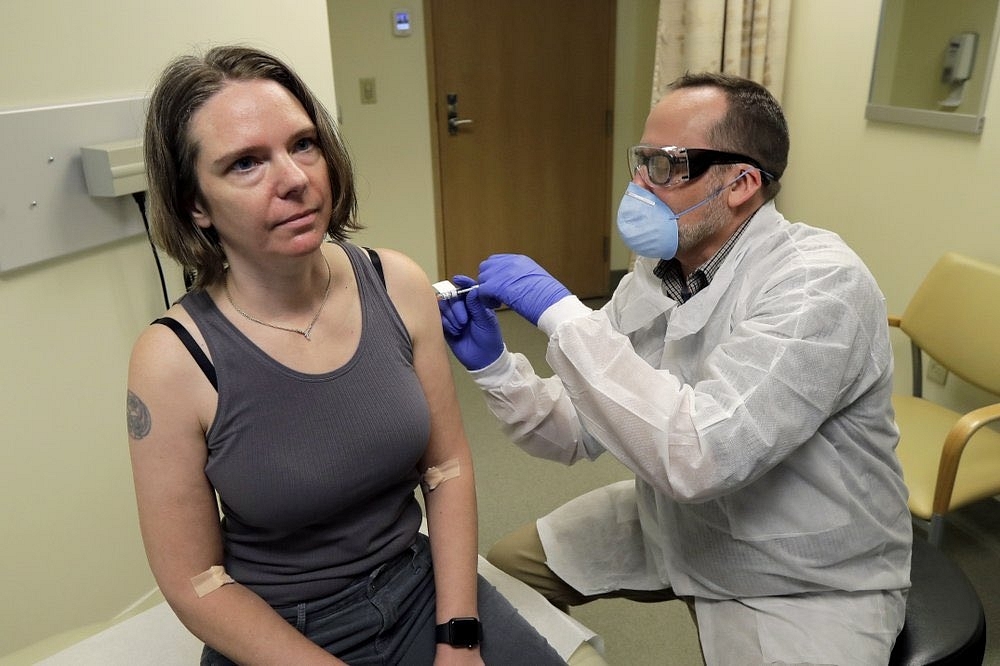Science
UK Launches Human Challenge Trial To Find Out Reinfection Possibilities In Covid-Recovered People
- The newly launched trial seeks to re-infect those individuals who have previously tested positive for Covid-19, rather than infecting people for the first time.
- This is an effort, says a news report, to deepen the understanding of immunity against the virus.

Clinical Trial of experimental Covid-19 vaccine (Pic Via Twitter)
In the United Kingdom, scientists have launched a trial that will deliberately expose volunteers with a history of Covid-19 to coronavirus again.
Known as human challenge trials, such a unique study is expected to help researchers to examine the immune response and see if people can get re-infected by the coronavirus.
Since the beginning of the pandemic, the use of challenge trials to accelerate vaccine development has been the subject of much global debate and discussion.
But in February, the United Kingdom became the first country in the world to give a green light for the trial in which participants are deliberately exposed to the Covid-19 virus to advance research into the disease.
Now, on 19 April British scientists launched the new trial. But it is different from the one announced in February.
The newly launched trial seeks to re-infect those individuals who have previously tested positive for Covid-19, rather than infecting people for the first time.
As reported by Reuters, this is an effort to deepen the understanding of immunity against the virus.
The chief investigator of the study, Helen McShane, who is a University of Oxford vaccinologist, said: "The information from this work will allow us to design better vaccines and treatments, and also to understand if people are protected after having COVID, and for how long."
Human Challenge Trial
Despite being controversial at the time of the coronavirus pandemic, human challenge trials are not new, as it has been performed safely in tens of thousands of people in the last 50 years.
Earlier, such trials have been used to study vaccine development, treatments and diseases like influenza, malaria, typhoid, zika, dengue fever, and cholera.
During the initial days of the pandemic, some experts proposed the idea for human challenge trials in terms of the development of better vaccines.
At that time, American top healthcare expert, Anthony Fauci, said that it was "not essential or ethically justified" at a time when the full health impact of the infection was not yet completely understood and highly effective therapies to cure trial participants were unavailable.
But according to a report by The Hindu, Dr Gagandeep Kang, Professor of Microbiology at CMC Vellore, said: “There are many things we do not understand about the virus, the infectious dose, the kinetics of the immune response, disease susceptibility and correlates of protection, which we could learn from the human challenge.”
She explained that such trials would help experts design better treatments and vaccines.
However, in terms of this recently launched UK trial, the first stage will include the establishment of the lowest dose of the coronavirus needed for it to start replicating in about 50 per cent of volunteers while producing a few-to-no symptoms.
In the second phase, trial participants will be infected with that standard dose.
Sixty-four people, aged between 18 and 30, who had Covid-19 at least three months ago, will be re-infected with the original coronavirus strain, in phase one.
These volunteers will be quarantined for at least 17 days. During that period, researchers will be monitoring their health continuously.
If anyone develops any symptom, they will be given Regeneron monoclonal antibody treatment.
According to a press release that was published on 23 March this year, the drug is claimed to be capable of reducing Covid-19 hospitalisation and death by 70 per cent.
Introducing ElectionsHQ + 50 Ground Reports Project
The 2024 elections might seem easy to guess, but there are some important questions that shouldn't be missed.
Do freebies still sway voters? Do people prioritise infrastructure when voting? How will Punjab vote?
The answers to these questions provide great insights into where we, as a country, are headed in the years to come.
Swarajya is starting a project with an aim to do 50 solid ground stories and a smart commentary service on WhatsApp, a one-of-a-kind. We'd love your support during this election season.
Click below to contribute.
Latest